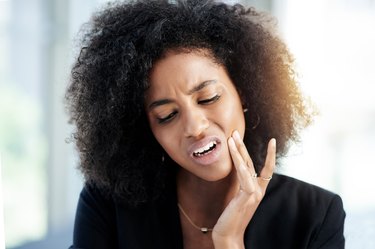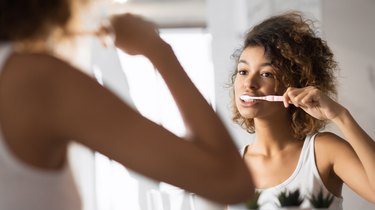

The Refresh is helping you freshen up on your oral-care knowledge and upgrade your dental-hygiene routine.
It's no secret that every dentist is a fan of brushing and flossing. In fact, let's brush up (har, har) on the American Dental Association's (ADA) recommendation for doing so:
- Brush teeth twice a day with a fluoride toothpaste
- Clean between your teeth (e.g. floss) once per day
- See your dentist for regular cleanings (as determined by your dentist, depending on the health of your gums and teeth)
Video of the Day
Hopefully you follow those recommendations for healthy teeth, but there are other things you can do during the day to promote proper oral health, which will help you avoid cavities, keep your breath fresh and lower your risk of long-term problems like gum disease.
Here's what dentists tell us they do on the regular:
1. Drink Tap Water
Provided you live in an area with safe tap water, consider switching from bottled to tap, Ruchi Sahota, DDS, a spokesperson for the ADA and a dentist in family practice in Fremont, California, tells LIVESTRONG.com.
"I drink fluoridated water, and I have my 6-year-old daughter drink it as well. It's a natural tooth protector," she says. "There are long-term benefits of fluoridated water making teeth more resistant to the acid attacks that can cause cavities."
Given how heavily regulated it is, as well as the very small amount present in drinking water, she feels comfortable safety-wise recommending it for both her patients and her own family.
If you don't want to go full tap water, consider making a couple of the glasses of water you consume in the day from the tap.
Water in itself — whether you drink filtered or tap — is helpful in keeping your teeth clean because it washes away leftover food particles. What's more, a dry mouth is more hospitable to bacteria that leads to tooth decay, Dr. Sahota says.
It's an even bigger problem if you regularly wear a mask, as face-coverings can make it easy to forget to sip. Make sure you're being extra diligent in drinking water regularly all day.
2. Give Your Teeth a Lick
Take a second right now to run your tongue over your teeth. Is there a layer of film on top? That's plaque that's been forming throughout the day.
When Dr. Sahota feels it midday, she removes the "furry stuff" by giving her teeth a bonus brushing session.
3. Munch on Crunch
Load up on crunchy veggies and fruits, Marc Lowenberg, DDS, of Lowenberg, Lituchy & Kantor in New York City, tells LIVESTRONG.com.
"These foods remove the bacterial plaque that sits on your teeth and cause decay or gum disease. Apples and celery are my favorites, but anything that 'crunches' improves the health of your teeth," he says. Salad for lunch, anyone?
One exception: Nuts may get stuck in the crevices of your teeth and contribute to decay, so prioritize crunchy foods that don't stay trapped in your teeth.
Related Reading
4. Snack on Nuts
Chewing helps stimulate saliva production, Dr. Sahota says. And remember, it's this saliva that aids in keeping your mouth clean.
"We know that foods low in carbohydrates won't add to your risk for cavities," she says.
That's why Dr. Sahota suggests nuts as one of the best snacks for your smile: They're low in carbohydrates, plus they contain a perfect trifecta of protein, fiber and fat to keep you full — so you're not reaching for sugary, high-carb snacks throughout the day.
5. Chomp on Gum
Sugar-free chewing gum that contains xylitol (a sugar alcohol) has the extra perk of helping protect your smile by stimulating saliva and strengthening teeth, Dr. Sahota says.
She chooses gums from those that have earned the ADA's Seal of Acceptance, which includes sugar-free gum from Eclipse, Orbit, Trident and Ice Breakers.
6. Let It Go
Stress is detrimental to your teeth.
"One of the most common areas that stress targets is the temporomandibular joint, the joint that opens and closes your mouth," Dr. Lowenberg says.
Stress causes people to clench and grind their teeth — often without even realizing it. And what might start out as clenching during stress becomes a habit that sticks around long-term, even during times of little stress, he says.
"Grinding contributes to chipping teeth or wearing them down with age," Dr. Lowenberg says.
One trick he uses? He writes the word "OPEN" on a sticky note to serve as a reminder to unclench and open his mouth. If you work at a desk, stick the note onto your computer screen to remind you to check in with your chompers throughout the day.
Plus, when you release your jaw muscles, you may find that it helps the rest of your body follow suit.
Was this article helpful?
150 Characters Max
0/150
Thank you for sharing!
Thank you for your feedback!
Is this an emergency? If you are experiencing serious medical symptoms, please see the National Library of Medicine’s list of signs you need emergency medical attention or call 911.


